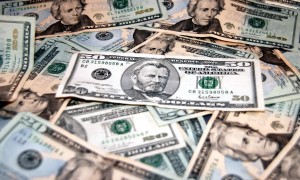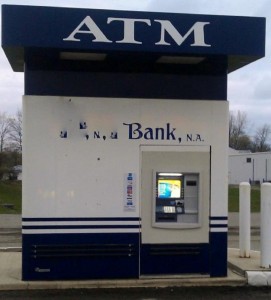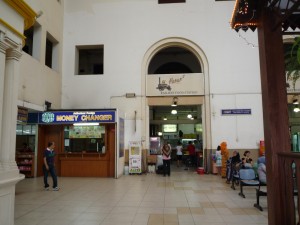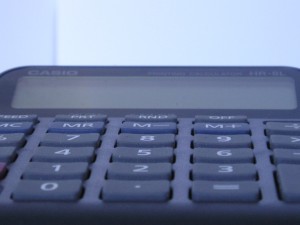Where to Exchange Currency
First know what the exchange rate is and second know where to exchange currency.
Credit/Debit Cards: Charging your credit card (or debit card) to purchase something with another currency generally is the best exchange rate. Your credit card will charge you a fee if you charge it  to another currency. American Express tends to be more expensive than Visa or MasterCard. Call them to check their rates.
to another currency. American Express tends to be more expensive than Visa or MasterCard. Call them to check their rates.
Be aware that depending on where you go, the merchant may also charge a transaction fee for use of credit. Out of the US, a lot of places may charge higher fees for American Express if they accept it at all. Visa and MasterCard are widely accepted in a lot of places. Always ask the merchant what the charging fee is before you charge. If you are charged a high transaction fee and a merchant fee, then getting cash from an ATM may be the better way to go.
ATMs: Getting cash from an ATM with your debit card will charge you the same exchange rate that the banks charge each other, without the middleman adding extra exchange fees. However, the  ATM and your credit card provider will usually charge you a fee for using the ATM. Sometimes it is a flat fee every time you use it, and other times it is a percentage of how much you withdraw. Usually the more you withdraw, the better the rate you get.
ATM and your credit card provider will usually charge you a fee for using the ATM. Sometimes it is a flat fee every time you use it, and other times it is a percentage of how much you withdraw. Usually the more you withdraw, the better the rate you get.
Make sure you don’t use your credit card to get cash withdrawals from an ATM (cash advance). You will be charged the ATM fee, the exchange rate, and a high interest rate on the cash withdrawn. It doesn’t give you the interest free for a month leeway to pay it back like it would if you made a charge on your card. Use your debit card instead so you aren’t charged the interest on the cash withdrawn.
You can also use an ATM card which only allows you to get cash from an ATM and is not linked to all of your savings and checking accounts. The benefits of an ATM card is that they are only linked to one checking account not all of them in case it was stolen.
Only take out the cash you need for the day or the next day if you will be around a lot of ATMs. You don’t want too much cash in case it were to get lost or stolen. You may pay a little more in fees, but you won’t be stuck with excess when you are headed home. If you end up with excess cash, you will most likely want to change it back into your own currency. This just means that you not only paid for the exchange rate (plus fees) to change it once, but twice. And you are more likely to be exchanging this last minute at the airport where their fees are way too high.
Remember if you use an ATM not affiliated with your bank you will be charged a fee from your bank and from that ATM provider. Some ATMs will try to charge US$5 per transaction, in this case go to another ATM. I have seen them as high as $20 per transaction from just one of the ATM providers, not the one I bank with.
ATMs can be targeted for crime. Cover your credit card when inserting it into the ATM in case a hidden camera is around. If the ATM eats your card see if you can pull it out with tweezers, if it is connected to a bank see if they can get it out for you, otherwise cancel the card. Make copies of all your cards, and leave some at home in case you need to get the numbers to cancel in a hurry. Always stuff the cash in your wallet as soon as you can and try not to count it in public.
Banks: If you need to get cash and you cannot find an ATM, go to a bank or post office to withdraw or exchange currency. You have to go during business hours and they can take longer especially if you don’t bank there, however you will save on the exchange rate. Banks can offer different rates, so shop around.
Exchange Kiosks: Avoid the exchange kiosks and booths you see at the airport, train stations  and around tourist attractions including hostels and hotels. They are usually open after banking hours which is convenient but you will pay for the convenience in their higher exchange rates. Some may say they don’t charge a foreign transaction fee, however the exchange rates will be more expensive, more than usual in replace of the transaction fee. You pay the fee one way or another.
and around tourist attractions including hostels and hotels. They are usually open after banking hours which is convenient but you will pay for the convenience in their higher exchange rates. Some may say they don’t charge a foreign transaction fee, however the exchange rates will be more expensive, more than usual in replace of the transaction fee. You pay the fee one way or another.
In some cases, usually in big cities away from transportation, smaller kiosks will offer better rates than banks. Shop around and compare rates.
Travelers Cheques are becoming less and less popular. The benefits to them are that if they were lost or stolen, you can cancel them like you would a check and get your money back. The downside is some places out of the country won’t accept them. You may need to go to a local bank to cash it, and you may be charged a fee. Sometimes the fee can be 10-15%. It may also take a while for the transaction, probably more time than you want to spend in a bank while on vacation.
You can get American Express Travelers Cheques and at the American Express Offices you can cash them free of charge. Make sure that you look at their directory so you know if they will have an office near where you will be going. They are difficult to cash anywhere else.
Know the Current Exchange Rates
Your best defense against getting bad exchange rates is to know what the exchange rate is. It can fluctuate several times a day, so check it before you leave home and while you are there. You can find it in local newspapers or online. Don’t trust the street kiosks to give you the correct rates!
Do Your Research
Call your bank and your credit card provider and ask them what foreign transaction fees are associated with charging your card in another currency. Ask them what fees are associated with withdrawing a different currency from an ATM. Ask them what fees are associated with using an ATM not affiliated with your bank. Some credit card companies and banks charge higher exchange rates than others. Make sure you also notify them that you will be traveling abroad so they don’t put a hold on your account for suspicious activity. American Express no longer requires you to notify them, but make sure you notify all other credit and debit card providers. Know what all the fees and rates are will be easy for you to know where to exchange currency depending on your location because every location can be different.
Be Prepared
If you are in some countries you may find that most people don’t even accept credit cards, so be prepared and take some cash, one or two credit cards and one debit card. You don’t want to carry too much cash in case it is lost or stolen. Try to separate the cash, so it isn’t all in one wallet. If you don’t have enough cash you may be stuck paying really high exchange rates.
Make sure you know your pin numbers before you leave. Being home you may not use the ATM very often to get cash. If you forget a pin number and you use all your cash because the country you go to wants cash for everything like restaurants that you didn’t really think about, you may have a hard time getting cash. Not having a pin number you can’t withdraw cash from the ATM. If you don’t bank with any of the banks that are available in the country you are visiting you may find yourself needing cash, but not being able to get it. Don’t bother calling the bank or credit card provider because they don’t have access to your pin numbers. You may be able to get money wired to you through a Western Union but if the country doesn’t have a Western Union or if it is hours away that doesn’t do you any good. Last resort you may get your hotel to charge extra on your room and give you some cash back, however you will most likely be charged a hefty 10% fee and most likely you can only withdraw a couple hundred dollars per day.
More Tips
Bargain, Bargain, Bargain: You won’t be able to negotiate exchange rates with banks, but if you are stuck with an exchange kiosk or small vendor you may be able to haggle a better exchange rate. This is why it is so important to know the current exchange rate. Your chances are better if there is more than one vendor in the area. Shop around as well; don’t settle on the first one you see.
Know the ‘Real’ Rate or Net Amount: Sometimes the posted rate will be the ‘sell’ rate. When you are exchanging money into the local currency you will be charged the ‘buy’ rate. Or sometimes the rate posted is only applicable to very large or very small transactions. Watch out for hidden flat fees that are added to each transaction. Watch out for extra commissions based on the amount of the transaction as well. You can ask them the net amount (amount you receive after all fees are paid) you will receive before you commit, shop it around then settle on the best one.
Using a Foreign Currency: Some places may accept another currency as well as their local currency. Some places like Mexico may prefer the US dollar over their local currency. If you use another currency make sure you know the current exchange rate so you don’t pay too much. This happens a lot when you get your change back in the local currency; they just exchanged your money for a fee without even telling you.
Use a Calculator: A calculator on your phone, or a hand held one may come in handy with exchange rates, and what is even better is an iPhone with internet access if you have it available. In case you don’t have internet, it is smart to know how to convert the exchange rates in your head, on paper, and with a calculator.
Download Apps: There are apps available for currency converter calculators or exchange rate calculators, but you will still need the internet for it to be current. This way you won’t have to do a search for it every time you use it and will save you a step.
Rounding Up: Be careful with rounding the exchange rates even to a tenth because if you are trading a lot of money it can add up quickly.
Never Exchange with a local on the street: Be very suspicious of someone offering you lower rates without a booth (or even with an exchange booth) especially if they are approaching you. They may give you counterfeit money, rob you, short change you, or simply being charging way too much. Most countries require a license for currency exchangers. They should have a certificate or government stamp of approval. If it seems too good to be true, it probably is.
How to use the currency calculators: When figuring out the exchange rate, always start with your currency first (the currency you hold in your hand not the currency you want to exchange it for). The lower the exchange rate is the less it is favorable to you. For example: If you have 1,000 USD and the exchange rate is .5555 then you will have 555.5 in the foreign currency. Compared to if the exchange rate is 1.333, than you would have 1,333 in the foreign currency.
Thanks for visiting Where to Exchange Currency
How to Exchange Currency will show you exactly how to figure out how much you are paying.







